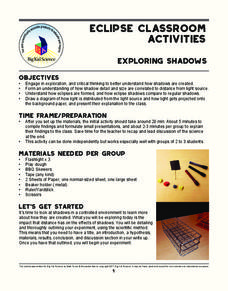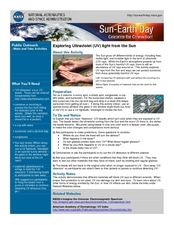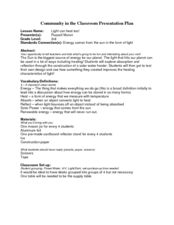Serendip
UV, Mutations, and DNA Repair
How effective are cells at repairing UV damage? An inquiry-based lesson has learners experiment with organism by exposing them to various levels of UV light and then examining their DNA after a period of time. Pupils test different...
G. Turrell
Science Activity 2: Light & Sound
Little learners experiment with sunlight and map out how light travels. Using a mirror and slotted card, they find out about items that can reflect or absorb the light. They experiment with a variety of materials to find out how light...
Clarkson University
Forms, States, and Conversions
Searching for a way to integrate multiple concepts of energy conversion while captivating a middle school audience? This lesson presents topics related to potential and kinetic energy and offers the ability to allow...
Teach Engineering
What Does Light See?
The second installment of a seven-part series focuses on the refraction of light and how it affects the colors we see. Learners consider how this concept connects to biosensors for cancer detection.
Virginia Department of Education
States and Forms of Energy
Energy is just energy, right? Explain various forms of energy to your young scientists by using an interactive experiment that contains common objects to demonstrate complex concepts. Pupils conduct experiments for radiant, thermal,...
Baylor College
Do Plants Need Light?
Turn your classroom into a greenhouse with a lesson on plant growth. First, investigate the different parts of seeds, identifying the seed coat, cotyledon, and embryo. Then plant the seeds and watch them grow! Measure the new plants...
Curated OER
Using Bubbles to Learn about Light Interference
Learners explain the wave properties of light.
Curated OER
The Grating Spectrometer; Light and Wavelengths
Students create a paper model that demonstrates wave interference for 3 wavelength from 2 sources. For this light and wave lesson, students use a real spectrometer and observe and measure the wavelength of spectral lines. Students then,...
Curated OER
Diffraction of Laser Light, Polarization and Color Filters
Students investigate light behavior by conducting a series of experiments. In this physics instructional activity, students calculate the wavelength of the light source using an equation. They determine what color is produced when light...
Curated OER
How Are Clouds and Fog Formed?
Fifth graders investigate how clouds and fog are made of tiny droplets of water. They discuss how clouds and fog are formed, then conduct an experiment in which they observe what happens when an ice cube is placed on top of a bottle...
Curated OER
Check Out Lights and Shields with Beads
Students explore Ultraviolet detecting beads and conduct several investigations with them. In this investigative lesson students participate in an experiment to see the harmful effects of UV light and discuss their findings.
Curated OER
Light and Shadows
Students explore shadows. In this shadow and light lesson, students predict what will happen to a shadow when the light source is dimmed. Students participate in a whiteboard interactive lesson.
Big Kid Science
Exploring Shadows
What's that lurking in the shadows? An activity that demonstrates how eclipses happen. Science scholars investigate how light and distance interact to form shadows. The experiment uses simple materials to generate data and observations...
Discovery Education
Through the Looking Glass
Turning white light into colors only takes a little scientific know how! Young scholars create their own spectroscope in a hands-on activity exploring the properties of light. Using a diffraction grating, they discover how white light...
Cornell University
Spectral Analysis with DVDs and CDs
Build a spectrometer to analyze properties of light. Scholars examine the spectrum from CDs and DVDs from two different light sources. Using the spectrum, they work to identify different elements.
Poetry4kids
How to Start a Poetry Journal
Practice makes proficient! Using a journal of their choice, authors organize pages, then begin their writing journey of on-going writing practice in which they compose all poetic forms including diamante, limerick, free verse, and more!
Curated OER
Graphing Quadratic Functions in Vertex or Intercept Form
Here is a study guide that breaks graphing quadratic functions into three simple steps. Quadratic functions in vertex and intercept form are included. Use during a lesson or afterward for skills practice. Note: Make sure your class has...
Curated OER
Got Light!
Sources of light, and the reflection of light off of objects, are the focus of this brief and simple science activity. Learners must trace the path that light takes which enables a boy to read a book. A suggested activity is to have the...
Curated OER
Exploring Ultraviolet (UV) Light From the Sun
Students identify the different energy given off by the sun. In this earth science lesson, students predict where the UV beads will turn the darkest color. They explain the importance of using UV protection.
Curated OER
Light Can Heat Too!
Third graders explore absorption and reflection of light energy. In this solar energy instructional activity, 3rd graders explore how light energy transfers to heat energy through the construction of a solar water heater. Students will...
Curated OER
Urban Heat Islands: An Introduction to Energy Transfer and Transformation
Elementary school physical scientists explore kinetic mechanical energy by dropping a golf ball on different surfaces. They discuss how human made materials might react to light differently from nature made materials. This lesson plan...
Curated OER
What is Energy? Different Kinds of Energy
Introduce physical science learners to the forms of energy using this PowerPoint. The concluding slides present scenarios for discussing the transfer of energy from one form to another. Informative text is crisp and attractive, but the...
Curated OER
Fluorescence
Here are some instructions for leading learners through a hands-on activity for investigating ultraviolet radiation. First, introduce them to light and refraction. Then introduce them to the electromagnetic spectrum. Finally, give...
University of Colorado
Designing an Open Spectrograph
Take the class over the rainbow. Pairs or small groups follow directions to create a spectrograph. The pupils measure the angles formed by the different colors of the spectrum along with calculating the lengths formed by the spectrum and...























